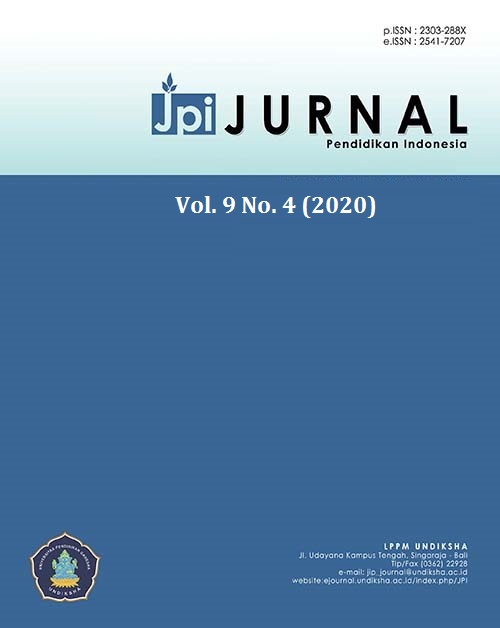The Differences of Students’ Self-Confidence Level in Full Day Class and Regular Class of Elementary School
DOI:
https://doi.org/10.23887/jpi-undiksha.v9i4.22356Keywords:
self confidence, Full day class, regular classAbstract
This study aims to compare the students’ self-confidence between special classes (full day class) and regular classes. The method used is a quantitative study with a comparative study as a research design. The research subjects were 90 students, 30 students form special class and 60 students from regular class. The results of this study have provided an overview of the differences between special classes and regular classes affecting the level of student confidence where students in special classes have high self-confidence compared to students in regular classes. And it can be concluded that self-confidence is formed and develops through the learning process in one's interactions with the environment so that class differences make different levels of student confidence.
References
Bolívar-Cruz, A., Verano-Tacoronte, D., & Galván-Sánchez, I. (2018). Do self-efficacy, incentives and confidence in public speaking influence how students self-assess? Cultura y Educacion, 30(3), 528–555. https://doi.org/10.1080/11356405.2018.1488420
Cimermanová, I. (2018). The effect of learning styles on academic achievement in different forms of teaching. International Journal of Instruction, 11(3), 219–232. https://doi.org/10.12973/iji.2018.11316a
Federičová, M., Pertold, F., & Smith, M. L. (2018). Children left behind: self-confidence of pupils in competitive environments. Education Economics, 26(2), 145–160. https://doi.org/10.1080/09645292.2017.1395811
Fitri, E., Zola, N., & Ifdil, I. (2018). Profil Kepercayaan Diri Remaja serta Faktor-Faktor yang Mempengaruhi. JPPI (Jurnal Penelitian Pendidikan Indonesia), 4(1), 1. https://doi.org/10.29210/02017182
Flowers, J., & Marston, A. (1972). Modification of low self-confidence in elementary school children. Journal of Educational Research, 66(1), 30–34. https://doi.org/10.1080/00220671.1972.10884394
Gürler, İ. (2015). Correlation between Self Confidence and Speaking Skill. Curr Res Soc Sci, 1(2), 14–19.
Hariko, R., & Ifdil, I. (2017). Analisis Kritik Terhadap Model Kipas; Konseling Intensif Progresif Adaptif Struktur. Jurnal Konseling Dan Pendidikan, 5(2), 109. https://doi.org/10.29210/120500
Hooper, C. (2018). The Mahabharata. Psychological Perspectives, 61(1), 76–91. https://doi.org/10.1080/00332925.2018.1422931
Kappes, H. B., Fasolo, B., Han, W., Barnes, J., & Ter Meer, J. (2019). Poor peer work does not boost student confidence. Journal of Behavioral Decision Making, January, 1–12. https://doi.org/10.1002/bdm.2148
Kastrup, H., Mallow, J. V, Lestari, H. P., Hartoto, S., Khory, F. D., & Prakoso, B. B. (2018). The effectiveness of collaborative problem based physics learning ( CPBPL ) model to improve student ’ s self-confidence on physics learning The effectiveness of collaborative problem based physics learning ( CPBPL ) model to improve s tudent ’ s self-con. IOP Conf. Series: Journal of Physics: Conf. Series 997 (2018) 012008. https://doi.org/doi :10.1088/1742-6596/997/1/012008
Komara, I. B. (2016). Hubungan antara Kepercayaan Diri dengan Prestasi Belajar dan Perencanaan Karir Siswa. Jurnal Psikopedagogia, 5(1), 33–42. journal.uad.ac.id
Lawal, A. M., Idemudia, E. S., & Adewale, O. P. (2017). Academic self-confidence effects on test anxiety among nigerian university students. Journal of Psychology in Africa, 27(6), 507–510. https://doi.org/10.1080/14330237.2017.1375203
Lestari, T., Mulyana, E. H., Nurzaman, I., Gandana, G., & Apriyaningsih, E. (2019). Exploring the integrating potentials of role playing with YouTube in building student’s self confidence. Journal of Physics: Conference Series, 1318(1). https://doi.org/10.1088/1742-6596/1318/1/012014
Passiatore, Y., Pirchio, S., Oliva, C., Panno, A., & Carrus, G. (2019). Self-efficacy and anxiety in learning English as a Foreign language: Singing in class helps speaking performance. Journal of Educational, Cultural and Psychological Studies, 2019(20), 121–138. https://doi.org/10.7358/ecps-2019-020-passi
Pettersson, C. (2018). Psychological well-being, improved self-confidence, and social capacity: bibliotherapy from a user perspective. Journal of Poetry Therapy, 31(2), 124–134. https://doi.org/10.1080/08893675.2018.1448955
Ramadhani, T. N., Putrianti, F. G., Psikologi, F., & Tamansiswa, U. S. (2014). Hubungan antara kepercayaan diri dengan citra diri pada remaja akhir. Jurnal UST Jogja, 4(2), 22–32.
Vanaja, Y., & Geetha, D. (2017). A Study on Locus of Control and Self Confidence of High School Students. International Journal of Research Granthaalayah, 5, 598–602. https://doi.org/10.5281/zenodo.841186
Vrij, A., & Bush, N. (2000). Differences in suggestibility between 5-6 and 10-11 year olds: The relationship with self confidence. Psychology, Crime and Law, 6(2), 127–138. https://doi.org/10.1080/10683160008410837
Wahyu Nanda Eka Saputra, H. P. (2018). Meningkatkan Percaya Diri Siswa melalui Teknik Cognitive Defusion. Jurnal Kajian Bimbingan Dan Konseling, 3(1), 14–21. http://journal2.um.ac.id/index.php/jkbk
Walid, A., Gamal, R., Kusumah, T., Doktoral, P., & Doktoral, P. (2015). Pengaruh Rasa Percaya Diri Terhadap Motivasi Berprestasi Siswa pada Mata Pelajaran IPA. Repository Iain Bengkulu, 217–226.
Downloads
Published
Issue
Section
License
Authors who publish with the Jurnal Pendidikan Indnesia agree to the following terms:
- Authors retain copyright and grant the journal the right of first publication with the work simultaneously licensed under a Creative Commons Attribution License (CC BY-SA 4.0) that allows others to share the work with an acknowledgment of the work's authorship and initial publication in this journal.
- Authors are able to enter into separate, additional contractual arrangements for the non-exclusive distribution of the journal's published version of the work (e.g., post it to an institutional repository or publish it in a book), with an acknowledgment of its initial publication in this journal.
- Authors are permitted and encouraged to post their work online (e.g., in institutional repositories or on their website) prior to and during the submission process, as it can lead to productive exchanges, as well as earlier and greater citation of published work. (See The Effect of Open Access)








